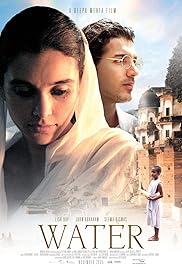WATER
(director/writer: Deepa Mehta; cinematographer: Giles Nuttgens; editor: Colin Monie; music: Mychael Danna; cast: Seema Biswas (Shakuntula), Lisa Ray (Kalyani), John Abraham (Narayan), Sarala (Chuyia), Manorma (Madhumati); Runtime: 114; MPAA Rating: PG-13; producer: David Hamilton; Fox Searchlight Pictures; 2005-Canada/India-in Hindi with English subtitles)
“Controversial for exposing the rigidity of the Hindu religion.”
Reviewed by Dennis Schwartz
Fire is the gripping last installment of writer-director Deepa Mehta’s “Elements” trilogy that includes the also powerful films of Fire and Earth. It tells of a sad chapter in the recent history of India, while holding in its rage and refusing to be preachy or go completely feminist. The rich visual (filmed by Star Wars photographer Giles Nuttgens) and musical rhythmic film is controversial for exposing the rigidity of the Hindu religion, the politics of the day and social mores. Religious fundamentalists actively protested, destroyed the film’s sets, and even threatened Mehta’s life, and eventually forced the filmmaker after a long delay to shut down and continue filming years later in Sri Lanka.
It’s set in the British colonial India of 1938, in the holy city of Benares, and it tells an emotionally compelling story about the plight of Hindu widows. Under Hindu law a widow’s options at the time are to marry her husband’s brother or choose to die while her husband is being cremated. Remnants of that practice remain in modern-day India. In the film, the widows are forced to support themselves either as beggars or prostitutes (this practice caused the religious fundamentalists to be unrelenting in their attacks on the film).
It plays out at a time Mahatma Gandhi bravely speaks out for the possibility of liberation for all through his passive resistance movement for independence. At the time there were millions of Hindu widows, of all ages, held as virtual prisoners until independence changed things. Though the subject matter can’t help but show so much of the misery, Mehta keeps things lively and sensuous as best she can.
The two heroines followed throughout are a feisty eight-year-old widow called Chuyia (Sarala) and the beautiful twentysomething prostitute named Kalyani (Lisa Ray), who bond when both are forced to live in a ashram for the remainder of their lives. The child upsets the business as usual of the ashram with her rebellion, while Kalyani begins a romance with a sensitive wealthy law student, inspired by Gandhi’s gentle voice of reason, a Brahmin named Narayan (John Abraham). The ashram is run with a heavy hand by the elderly widow Manorma (Madhumati), who can’t keep the spirited child in line. Eventually, Chuyia is forced to accept her fate as her parents do not come for her as expected. The middle-aged religiously devout Shakuntala (Seema Biswas) offers the irrepressible Chuyia the maternal love she needs, as the sensitive woman begins to question the cruelty of the law and its enforcement. The other widows merely accept it as their cursed fate, therby Shakuntala becomes a pivotal character for change.
The title takes its name from the Ganges River, where in the opening scene the child’s dying husband is brought and it’s the river that’s nearby the ashram. Kalyani has her own room apart from the others in the ashram, where she has a postcard picture view from her terrace of the ever changing metaphorical river.
I can’t say enough about Chuyia’s endearing performance, she gives the film its life force. Ray and Abraham, big name stars in India, look handsome together, as their forbidden romance borders on soap opera but acts to lift some of the misery that overwhelms the film. It’s an important film in more than a movie way as it turns out to be not only well-made, unsettling and tense, but is also so provocatively issue-orientated. It’s a good thing Mehta couldn’t be stopped from making it, since she obviously hit upon a raw nerve that needed this exposure.
REVIEWED ON 7/9/2006 GRADE: B+
